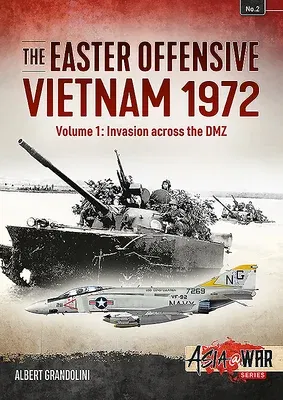On 30 March 1972 the South Vietnamese positions along the Demilitarized
Zone (DMZ) that separated the North from South Vietnam were suddenly
shelled by hundreds of heavy guns and multiple rocket launchers. Caught
in a series of outposts of what was the former 'McNamara Line', the
shocked defenders had just enough time to emerge from their bunkers at
the end of the barrage before they were attacked by regular North
Vietnamese Army divisions, supported by hundreds of armored vehicles
that crashed though their defensive lines along the border. Thus began
one of the fiercest campaigns of the Vietnam War but also one of the
less well documented because by then most of the American ground forces
had been withdrawn.
Following on from the details of the downsizing of American forces and
the setting up of the 'Vietnamization' policy, the build up of both the
Army of the Republic of Vietnam (ARVN) in the South and the People's
Army of Vietnam (PAVN) in the North is discussed at length. A special
emphasis is devoted to the study of the development the North Vietnamese
armored corps that would spearhead the coming offensive. Consequently,
the nature of the war changed dramatically, evolving from a guerrilla
one into a conventional conflict.
The South Vietnamese resistance shuddered, and then crumbled under the
communist onslaught, putting Hue the ancient imperial capital at risk.
It was only thanks to US airpower, directed by a small group of
courageous American advisers, which helped to turn the tide. Under the
command of a new capable commander, the South Vietnamese then
methodically counterattacked to retake some of the lost ground. This
culminated in the ferocious street fighting for Quang Tri.
This first volume describes the combat taking place in the northern part
of South Vietnam, and uses not only American archives but also
Vietnamese sources, from both sides. The book contains 130 photos, five
maps and 18 color profiles.
Asia@War - following on from our highly successful Africa@War series,
Asia@War replicates the same format - concise, incisive text, rare
images and high quality color artwork providing fresh accounts of both
well-known and more esoteric aspects of conflict in this part of the
world since 1945.

